With so much writing around the topic I have felt the need to simplify what resilience is and confirm what I feel is absolutely relevant to individuals and teams within todays context.
The two photo’s I shared are foundational to my understanding of resilience.
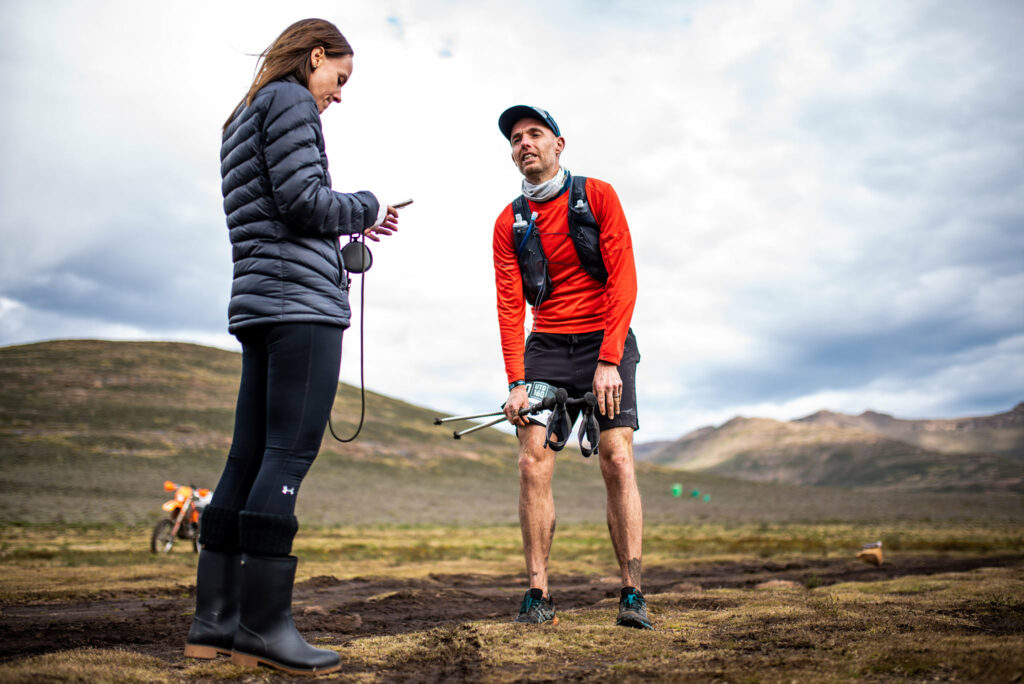
Pic: Devin Paisley
The first photo was taken exactly 32km into my last 100 mile trail run. As you can see from the grimace on my face I was not in a good place. My friend Claire is with me. She is not on facebook while I die in front of her, but is checking me in and messaging my wife to let her know I had arrived. I had been dizzy for the past few hours. I was nauseous when I arrived at the aid station and I was feeling broken and completely disconnected from myself and the race. I also knew that I should not be feeling this way should I be on track for my time goal. In many respects, the race was getting the better of me and I was in a deep emotional valley, full of disappointment and overwhelmed by the what lay ahead, unsure as to whether I would be able to carry on. To continue the story, I did carry on knowing that there was another aid station at 44km but felt even worse when I arrived there. That was the lowest point of the race for me and definitely where I came very close to giving up.
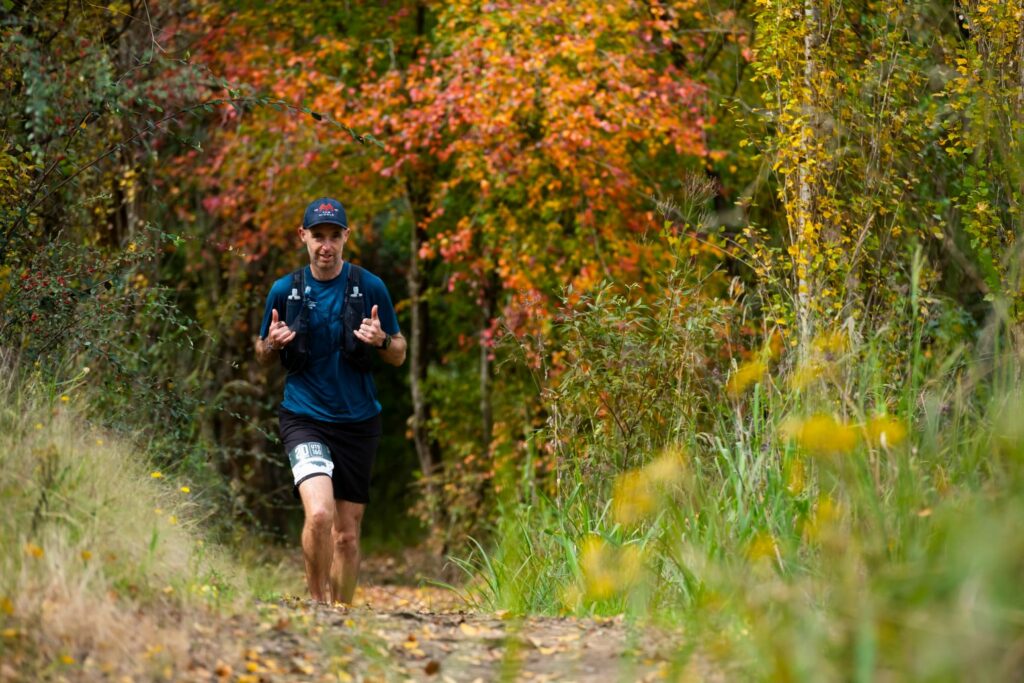
Pic: Anthony Grote
The second photo was taken at approximately 132km into the race. I was feeling myself again despite sore feet, was in the zone and running steadily and was clawing back some time. More so I was enjoying myself. I had let go of my time goal but I was chuffed that I had been able to rise up to the challenge and knew then that I would reach the finish.
Both these photo’s represent some key resilience themes, unpacked below:
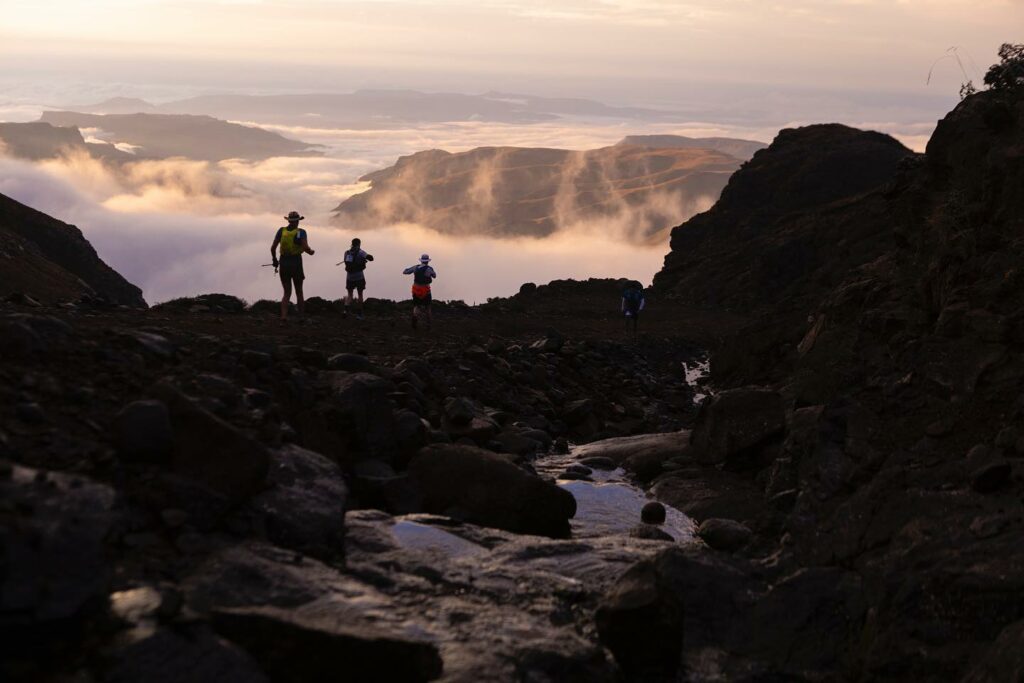
Pic: Nick Muzik
LIFE IS A SERIES OF JOURNEY’S
The photos represent two sets of emotions, experienced at two different moments in time but on one journey. Life is a series of journeys. Those journeys include school, tertiary education, career journeys, entrepreneurship journeys, projects we take on, races we take part in, marriage journeys, parenting, relationship journeys as well as common journeys such as being a citizen of our country of residence along with the faith journeys we walk in our various communities.
Some of these journeys last a short while. Some of them last a lifetime. To live well is to journey well. As one journey finishes, so we enter into a new journey. That’s why The Middle exists. In order to reach the finish we have to navigate The Middle. I call this Middle Intelligence. If we can learn to navigate The Middle well, we can finish well no matter what we face.
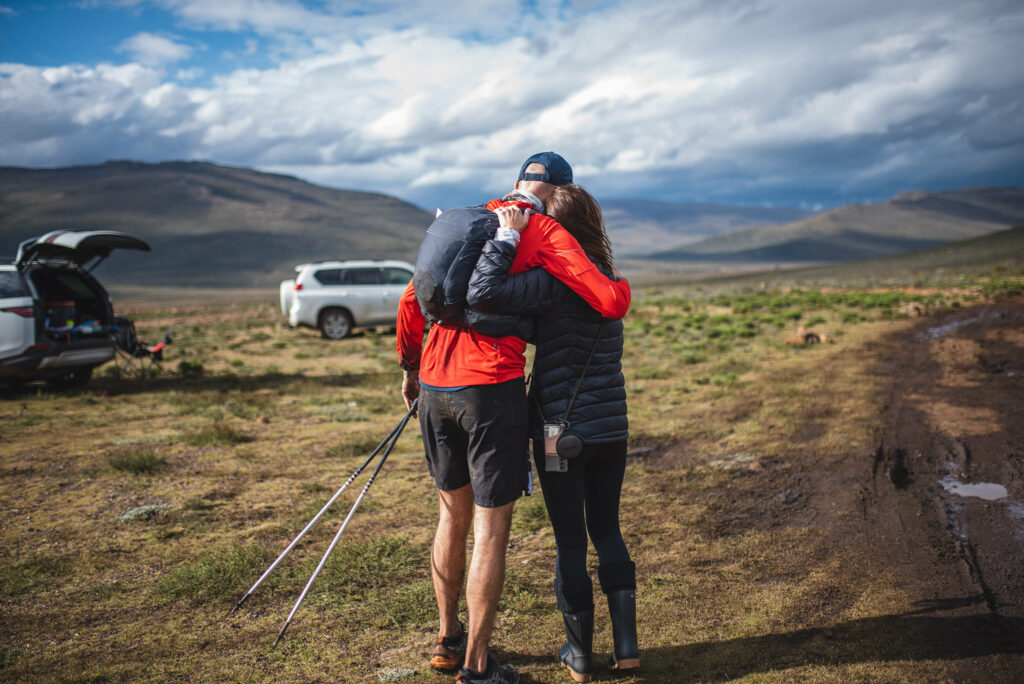
Pic: Devin Paisley
A MEANINGFUL JOURNEY WILL INCLUDE ADVERSITY
At 32km I was in the pit. I was experiencing adversity. I was having to push through mental, emotional and physical barriers in order to keep moving forward. The Middle book opens up with a chapter on a key insight stating; every start is followed by a DAY 5. Keep going. Reflecting on the fifth day of a round the world cycle tour, the chapter unpacks the exceptionally tough day that we faced to ride between two cities on that day. The external conditions and our internal challenges brought us face to face with what we had actually signed up for and it was not what we expected to see. The book presents the ideas that no matter what the journey, if it is meaningful it will include adversity. I have not heard of a long marriage that has not included tough times and strained relations. I have not heard of an entrepreneurship journey that has not included barriers and challenges to overcome in order to build a brand. It’s the boss you didn’t expect to work for, the issue you are having with your friend, the conflict with your parent, the coworker who is giving you a hard time, the targets which you can’t meet, the way you feel at 5km into the race, the funding for your project drying up, the sickness you end up having to deal with or the pandemic that all of a sudden pitches up on all of our doors.
Life is a series of journeys. Each of the journeys will include adversity. It would make sense then, that navigating The Middle requires learning to deal with adversity. To journey well is to deal well with adversity.

Pic: Nick Muzik
YOU WERE MADE FOR TOUGH TERRAIN
In order to deal well with adversity we must first acknowledge that we, as humans, are designed to take on tough terrain. I am amazed at how our human body can withstand so many knocks and still keep on going. In the same way, when I listen to the stories of those who have gone through a series of hard knocks or lived a life of pain I am blown away by what we can withstand. Human beings are fragile and in many respects vulnerable but we have a tough core and are built to last, no matter what has been thrown at us. As soon as lose the belief that we don’t have what it takes to navigate challenges, we lose hope, resign ourselves to disappointment and find ourselves slipping into depression and other associated diseases and issues.
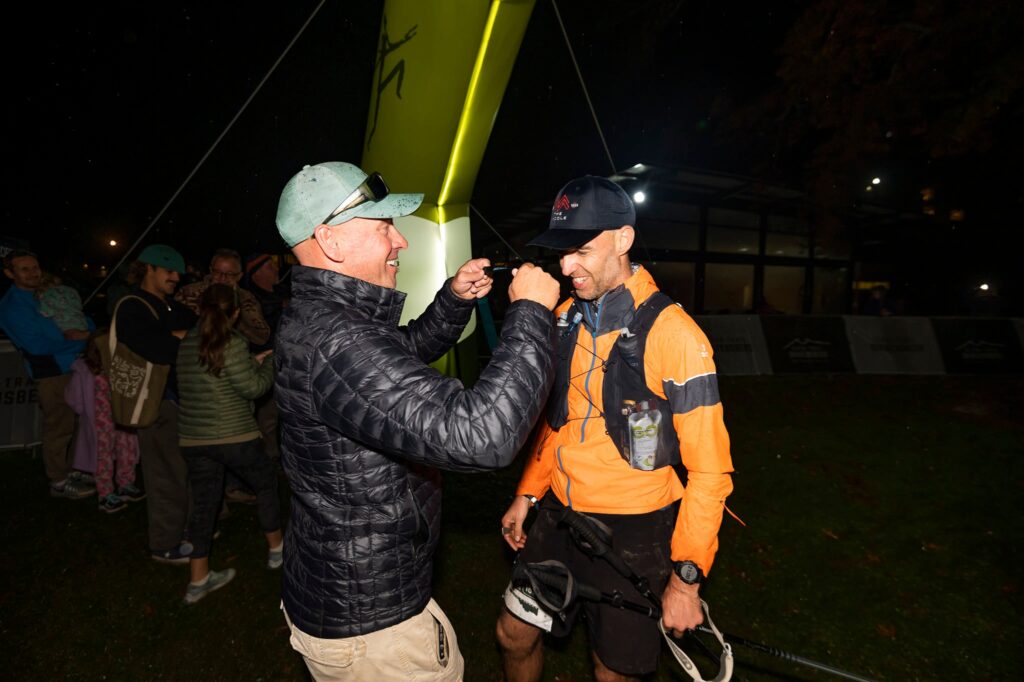
Pic: Anthony Grote
RESILIENCE WILL ENSURE YOU FINISH WELL
Resilience is defined as ability to recover well from setbacks, adapt well to change and keep going in the face of adversity. There you have it. Resilience is what ensures you can keep going in the face of adversity.
This is where we must bring in a key aspect of the reason why we are resilience or why resilience is needed. If we deem resilience to be something that supports our ability to endure challenges, we may align ourselves with the belief that life is exceptionally tough and that we simply need to leverage resilience to grit it out and survive. Sure, resilience will ensure you survive but for me, resilience is needed to ensure you finish well.
Adversity is something that works against you. It takes away something from you or it presents itself as a barrier to what you expected would happen or wanted to achieve. When we face up to too many ongoing challenges we can find ourselves losing hope. We stop expecting good things. We stop dreaming. And that’s when we enter into survival mode. Resilience is needed to finish well, not to survive which means as humans we must develop resilience WHILE we expect good things and aim for bold visions and dreams. Resilience is a skill that we need to fulfil what we hope for and to reach the goals we set for ourselves, not simply endure each day. We need to learn not only to survive, but to deal with challenges in such a way that we are able to remove them or work around them while maintaining momentum toward what we hoped to achieve. We are, as humans, natural creators. To dream and to expect good things for our lives is part of human nature. To stop dreaming or to stop expecting good for our lives is to lose hope and to, in reality, die emotionally and mentally before we die physically. Resilience and dreaming must be parallel, intertwined tracks, working with each other to ensure you keep living a meaningful life.
The key question is what will it take for you to achieve your goals and to live the life you desire NOT, what would it take to survive another day. Dipping into the corporate space, the same applies for your teams. Resilience for teams is not about ‘getting through’, its about a team’s ability to navigate challenges whilst keeping focused on the vision of the company and creating a high-quality work experience.
Individuals must leverage resilience to achieve significant things.
Teams must leverage resilience to achieve significant things.
But how?
The 7 principles of The Middle Journey unpack in detail how to create a resilience eco system. A few of those principles are particularly relevant for this article linked to the experience of running 100 miles and the definition of resilience.
Firstly, we have to be present in our circumstances.
At 32km I had to own what I was going through. Human beings have a tendency to numb when facing adversity. There are so many attractive numbing options, or distractions that can make us feel like we can ‘put up’ with pain while we get small pockets of enjoyment in between. These distractions that we use to numb predominantly include things like social media, binge watching series, alcohol and food. Resilience is about facing up to your circumstances and being fully present in them. This is where I am. This is what I am going through. This is what I am feeling. This is what I am thinking. Right here. Right now.
Secondly, we have to control the controllable’s.
There was lots for me to focus on. The exceptionally wet Lesotho ground. The temperature. The terrain. The high water levels. The remaining distance. The state of my shoes. The fact that I had fallen and was wet and muddy. As we say in The Middle; what we focus on expands. Too many individuals and teams get lost in what they can’t control. Of course, we can’t ignore what we can’t control as we may need to plan for it down the line. Dry shoes and socks, for example, would be needed given the wet ground. But at 32km I could not control many of those factors. What I could control was my nutrition and my gear. So that’s what I chose to focus on. Getting food into me became the core focus, checking what I had eaten and what I needed for the next section, eating as much as I could, holding it down, checking my gear and then after a short rest and some hydration getting back out there.
Thirdly, we have to keep shooting for the goal.
This one for me was intriguing. I knew that I was probably not going to make it if I continued to feel how I did. But I kept up the expectation that I would either meet my goal or come close to it. In the end, I was off the goal by almost 3hours. But by holding onto hope and expectation for good, I ran the best race I could that day. If I resigned myself to the fact that I was not going to reach my goal and chose to, at 32km, slow right down or even just walk it out I would have been far off the time and placement I ended up achieving. Individuals and teams need to hold onto a clear and ambitious vision. We need to expect good for our lives. And we need to go for it, no matter how we are feeling. Resilience is about momentum; to keep going despite adversity. If we keep going, the body has an uncanny ability to bounce back. The tough times you are experiencing now will not always be there. But when you enter into the good times you want to make sure you did not lose too much ground during the bad times. Of course, within that I had to be open to change. I knew, realistically, that I was not going to reach the set goal, but I was able to adjust the meaning of a the expected time I would arrive and deem that to be significant based on how I felt and what the conditions were like. In other words, I was able to embrace a change in goal and attach significance to that goal.
We have to believe we can finish well. My journey and yours will include a myriad of circumstances, positive and negative which we will have to deal with. That’s life especially in today’s world. If we can be present in our circumstances, control the controllable’s and maintain momentum through the attractive visions and expectation for good, we can still achieve significant things.
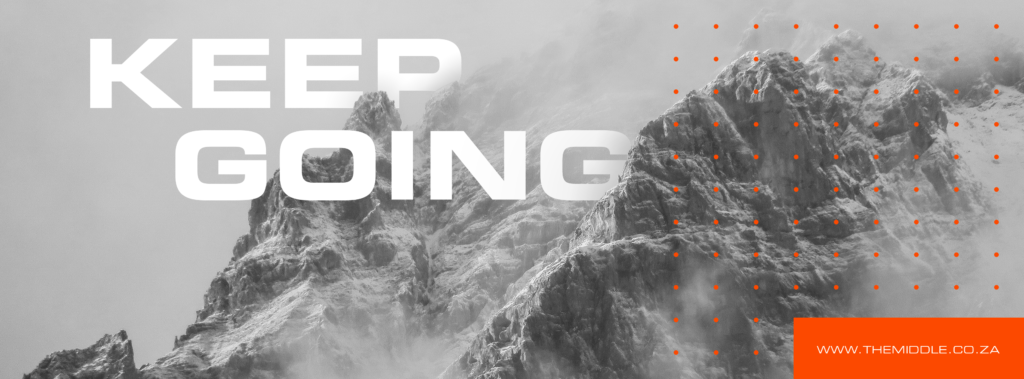
Article written by: Travis Gale